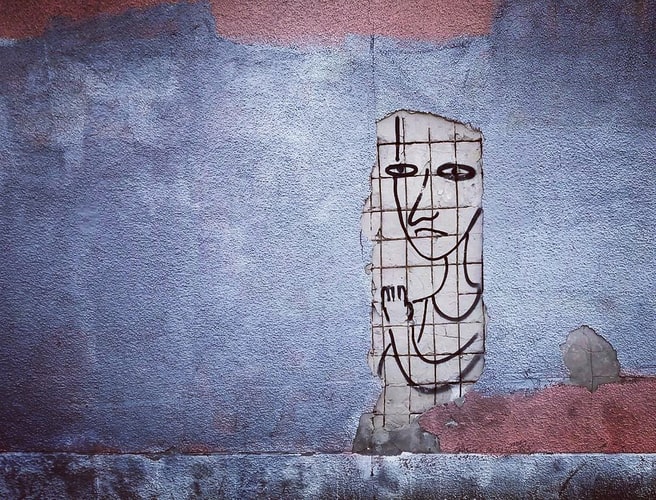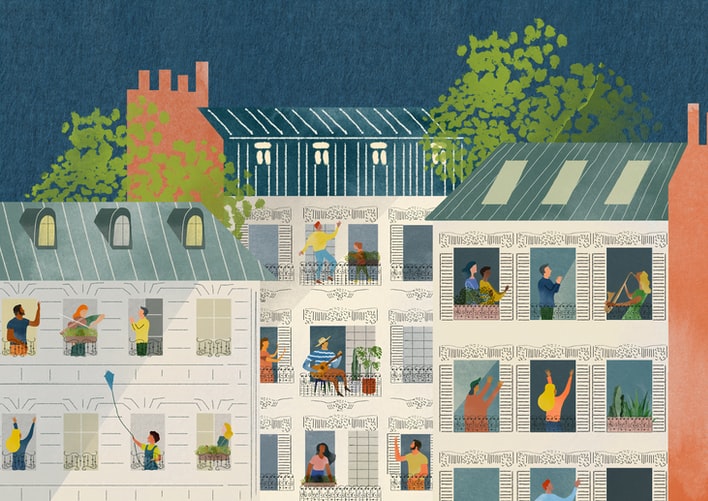In a country where accessibility to mental health therapy remains limited and our dependence on devices is at an all-time high, the coronavirus pandemic has had a deeply detrimental effect on mental health with people being forced to cut off social contact and self-isolate.
Outside of all non-essential work having moved online, social distancing mandates that video calls also remain a tool to foster off the clock connections, but psychologists claim that this can lead to “video chat fatigue” or a concept known as ‘the presence of absence’ that further reinforces physical distance between people.
In a bid to understand what the effect of continued communication through virtual channels can do to a person’s mental health, social abilities and skills – since so much of human interaction is contingent on non-verbal cues and body language – I spoke to some people who have been isolating alone, both in India and overseas, to understand the effect it’s had on them and what they’re doing to cope with it.
Mallar, 29, film music composer & producer
“My life hasn’t changed that much because as a freelancer, I often work from home. The process of doing chores and cooking has been helpful. It helps me forget that I’ve been locked up alone for three months now.
What does make it a bit anxiety-inducing is the lack of choice and clarity. My ADHD has gotten out of control from time to time. I often find, that in the absence of a “system”, it’s impossible for me to stick to any order in terms of work or chores. I’m not currently in therapy but I think I’d want to do it. I don’t know if I can afford it – not everybody has a sliding scale.
Social media has honestly made it worse and I took a break from it in the middle. I honestly think I would’ve lost it if I were constantly on Instagram or Twitter at a time like this. Hopefully this habit will last. There’s a strange disconnect which has grown over this time. It’ll be scary if this situation gets normalised in the post-Covid world.”
Anonymous, 30, beverage consultant
“I’ve been both good and bad. Considering I’ve been trying to realign myself for a while now, this feels like an extension of that work. But some days are a reminder of how this is ‘forced’. That proves counterproductive, even detrimental, at times. Weightlifting at the gym had helped stabilise my mental health issues by giving me back a sense of control and I felt that I might unravel without it. Cooking and sharing food photos with my loved ones every day is what has been getting me through this time.
I still haven’t done any ‘Zooms’ or ‘house parties’ and even video calling has been to the bare minimum. I have been texting a lot more, but only because there’s so much outpour of concern.
Although, the lockdown has taken the pressure off from being a highly-functioning adult and has normalised these conditions, if not taken away the stigma associated with them entirely. I would like to go to therapy but I certainly can’t afford it during a pandemic where priorities are food and rent.”
Also read: Watch | COVID and Rising Mental Stress: What Are the Solutions?
Ayeesha, 28, tech sales
“Some days are better than others. I’ve been painting and cooking a lot, so that’s helped. My mental health was horrifying in the beginning. I stay in a tiny 1-BHK apartment and the lack of space to move within dampened my spirit more than I thought it would. And living alone is different than quarantining alone – when interactions with the grocery guy, the help and the office folk are all taken away, it can make you really anxious and uneasy because it feels so unnatural.
Digital interactions have been unfulfilling. It’s hard to have a conversation with your best friend and not hug them for three months. I have a therapist assigned from my workplace, and we connect online occasionally. I’m not sure I find her super helpful, but that’s also because she’s doing mass therapy and using platitudes and toxic positivity on me – so I stopped attending her sessions.
I’ve been having major skin breakouts. I don’t know if it’s because of stress. The pressure to be productive is high mostly because everyone at work is at it and this is not the kind of job market you want to slack in.”

Souraj, 27, ad-film director
“It’s been good and bad. If anything, this has been a complete lifestyle change, as good as moving to a new city or a new field of work. Mental health is a slightly scary subject. Having had some bad phases in the past, it’s scary to think how easily I can slip into another phase when isolated from people and activities. That’s as scary as contracting COVID-19.
I am constantly trying something new – whether it’s finding new music or movies, or discovering new ways to cook omelettes just to keep myself distracted. I do not go into therapy but I have considered it. It feels like a big cost, especially when nothing is blatantly wrong. An annual physical check-up is Rs 2,000 – something you do even when you do not have any symptoms. What is the equivalent for mental health? That’s an answer I do not know or can find on the internet.”
Also read: Bloggers Turn ‘Mental Health Influencers’: Monetising Pain for Personal Gain
Shambhavi, 26, master’s student
“I was just entering my final term of the year when the lockdown was announced in the Netherlands. This meant that I had to get used to online classes and going from seeing my friends every day to not at all but still having to work on group projects and assignments.
I realised that the closer I got to the summer holidays, the more lost and aimless I would feel because most internships have been called off. I felt extremely helpless watching the news and feeling like I couldn’t do anything to help while the world was thrown into utter chaos. I would welcome the overwhelming sadness at times and use it as a way to feel more in touch with my humanity.
There are many days where the lack of verbal communication would affect my mood and put me into quite a depressive state where all the underlying feelings of loneliness would rise to the surface. And I suppose as a person who can have depressive tendencies, I find it hard to reach out for help.
Yesterday was the first time in more than a week that I felt like I was emerging from a haze of sadness and apathy. I feel there is more pressure to package productivity as a way to be selling yourself online now. The anxiety is definitely also linked to being a masters student and the pressure of trying to find a job/make a career for myself.”
Shachi, 25, writer, political strategist, social worker
“Overall, I’ve been doing okay during the lockdown. But, if you asked me during the bad weeks, I’d have said it’s not going well. It’s been cyclical. I think I’m in the positive cycle right now. I’m used to living alone, as I have been doing so for the last four years. But this is the first time I haven’t seen anybody for so long.
It’s been really difficult but I think I would be unhappier if I had been locked down with other people. In the beginning, I was freaking out and was completely addicted to Twitter. There were a lot of Zoom calls. Everybody was getting in touch and trying to be there for each other but collectively, everybody got saturated. I’ve been dealing with anxiety and depression for the past several years and therapy has really kept me sane. I find that digital interactions with my therapist work pretty well too. It creates accountability and that’s the thing I look forward to.

Naina, 30, actor, Mumbai
“I think I’m incredibly lucky to have everything going for me the same way it was. Just when the lockdown began, I’d just gotten back from Europe and I had sort of seen it over there and I knew we were in it for the long run.
At the beginning of the lockdown, I’d made up my mind to not complain. I also decided that I had to be productive. I think social media has helped me a lot while staying alone. I have started using the tripod lying around my house and taking self-portraits and sharing them online. I’m learning a new language. I’m also taking music and sketching classes online.
The film I did last year was showcased in an online film festival and there was a humongous response from the audience. That one week of the screening and people reaching out to me was a highlight.
If it weren’t for the digital interactions, I would have felt very suffocated. I used to go for joint therapy with my brother a while ago. Post that, I stopped doing the sessions because I didn’t need it. I’m living off my savings from the last six months. I think I can afford it right now but I wouldn’t be able to sustain it long-term.
I do get bouts of anxiety because my parents fight a lot. I feel like my father needs professional help. It’s easier for people in our generation to talk about therapy and look out for our mental health. I asked them if I could come home if they’re not in a good place but I don’t want to travel and contract something. I keep thinking of my parents a lot.”
Also read: Your Mental Health Matters, but Which One?
Jahanvi Dutta, 24, admissions officer, New Delhi
“I’ve been in Delhi for the lockdown. Some days have been awful and terrible. Not being around even just one more person has added to my anxiety a lot. A lot of my coping mechanisms come from social interaction. There is nobody to turn to or go to or bounce my thoughts off.
I’ve had thoughts of falling sick and nobody being around to help. The quantum of work certainly doesn’t help with that. My gadget time is out of control too. Video conferencing, calls, laptop. Post-work, I tend to read or watch something to relax but my eyes are strained all the time. It makes me feel shitty but I don’t know what else to do.
I do go to therapy, but in person. I find it comforting to be in the physical space with my therapist. I’ve conditioned myself to feel vulnerable in that environment. With that being disrupted, therapy feels unsettling. The talk of mental health has come much later during the pandemic.
In the beginning, it felt like people were just trying to outshine one another with what they were doing. Posting pictures of fancy meals online or reading excessively or developing a new hobby. Social media has become a space where so much is discussed, but every time I log on, there’s a worse piece of news. I see people sharing their opinions sometimes in a problematic way and being by myself and having to stomach those feelings has been quite exhausting.”
Alina Gufran is a screenwriter and non-fiction writer based out of Mumbai.
Featured image credit: Ahmed Nishaath/Unsplash (Editing: LiveWire)

